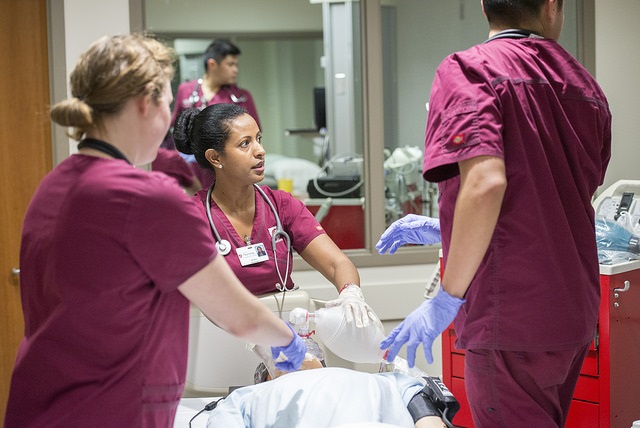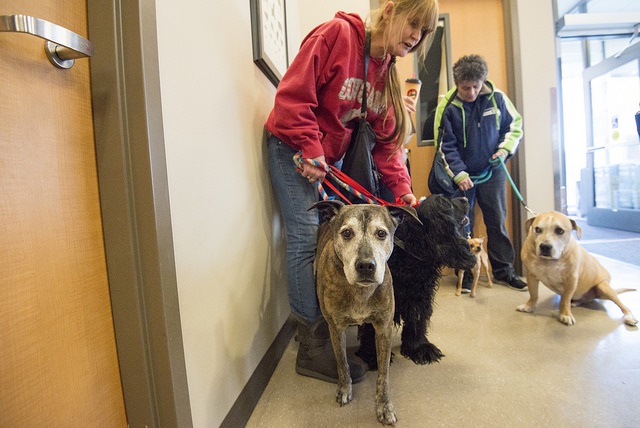
A strategic plan is a road map for an organization, one that lays out its priorities and purpose.
The administration, faculty and staff of the WSU College of Nursing recently finished the process of creating the college’s latest road map – the 2017-2020 Strategic Plan.
That process began in 2016 with broad-based talks about the future of nursing education and research. Successive meetings helped narrow and define the four elements of the College of Nursing strategic plan, and lay out sub-goals under each of those strategies.
“The most important thing about creating a strategic plan is making sure everybody is involved,” said Dean Joyce Griffin-Sobel of the College of Nursing. “We need to hear all opinions and viewpoints. We went out of our way to do that, because we wanted a strategic plan for the College, not just the Spokane campus.”
Here are the four main elements of the WSU College of Nursing’s strategic plan:
INNOVATION IN EDUCATION AND PRACTICE
“We lead innovation in academic nursing that promotes team-based interprofessional health care, and prepares quality leaders, clinicians, and researchers.”

For more than a century, nurses have been educated to care for people in hospitals who are seriously ill or injured.
But in the 21st century, nurses are spending more time treating chronic conditions like diabetes, hypertension and kidney disease, often in community settings instead of hospitals.
Nursing education needs to catch up, said Dr. Lisa Day, Vice Dean for Educational Innovation at the WSU College of Nursing.
“We need to shift the teaching focus away from acute care and toward health promotion, population health, and prevention,” she said.
She added that any changes made to nursing education could have important ripple effects.
“RNs could take on a much more rich role in primary care,” Day said. “Innovation in education could actually push innovation in health care.”
It’s a view shared by influential organizations including the American Association of College of Nursing, the Institute of Medicine and the Robert Wood Johnson Foundation.
Nurses working in community clinics, schools, home-health agencies and businesses can help identify patterns of illness across populations, link patients with community resources, and influence policies. “Much of the emphasis in health care will be shifted toward preventive care and the promotion of health,” AACN said. “The nurse will be asked to take on a broader and more diverse role in this system.”
Said Day, “Our health care system still focuses so heavily on acute care. We need to shift that thinking for people considering going into nursing, to the role they’ll play in community-based nursing. It’s not crisis-oriented, but instead oriented toward public health.”
ENGAGEMENT WITH OUR COMMUNITIES
“We strengthen alliances and partnerships with health care systems and stakeholders to address health equity, and to support the achievement of optimal quality of life and affordable, accessible care.”

Patrick snuggled his small dog, Maggie May, inside his jacket as they stood in the cold. The two were in line an hour before the inaugural Healthy People + Healthy Pets clinic was scheduled to open.
Students and faculty from the WSU College of Nursing and College of Veterinary Medicine offered vaccinations, health screenings and simple treatments to homeless and low-income people and their pets. Nearly 100 people and 125 dogs and cats were seen by the end of the five-hour clinic – a turnout that topped even the most optimistic expectations.
“I thought we’d be successful if even 15 to 20 pets and people showed up,” said Assistant Professor Gail Oneal, of the College of Nursing, who organized the event with Dr. Raelynn Farnsworth, Clinical Assistant Professor at the College of Veterinary Medicine in Pullman. The deans of the two colleges – Dr. Joyce Griffin-Sobel and Dr. Bryan K. Slinker – thought up the idea for the clinic while talking and walking up one of Pullman’s long hills.
But it’s just the latest example of the ways College of Nursing students and faculty engage with communities – and have done for nearly 50 years. Students and faculty fan out across the region each fall to give flu shots and vaccinations and volunteer their time at children’s camps during the summer. They host teenagers who want to learn about nursing careers, and travel to South America, Asia, and Africa to provide much-needed health care and expertise.
One woman, who brought multiple dogs to the Healthy People + Healthy Pets event, wrote an email afterward expressing her appreciation.
“I can’t even express how thankful I am,” she said. “Thank you for helping us out with everything – dog food, treats, coats. It was amazing.”
Said Dean Griffin-Sobel after the clinic, “This is the epitome of service learning and is exactly what our strategic plan aims to do.”
SCIENCE OF HEALTH
“We will be a national leader in innovative science addressing health disparities to improve population health in Washington state and beyond.”

Like many nurses, Marian Wilson was on the front lines of America’s opioid crisis. She worked in a community hospital, where the emergency department was trying to reduce repeat visits from people with chronic pain. The plan was to refer those patients to primary care or pain specialists. Yet, many were distraught if they left their ER visit without an opioid medication.
“I felt like we should offer them more help,” said Wilson, now an assistant professor at the WSU College of Nursing and executive faculty at the Program of Excellence in Addictions Research. “I found some online programs to help people self-manage their symptoms. I don’t think the internet is necessarily the best solution to help people with their pain, but I do think it’s something, and it’s better than the ‘nothing’ some people felt they were getting.”
That spark has guided much of Wilson’s research at the College of Nursing. She’s led and participated in multiple studies testing online resources and their effectiveness in helping people manage their pain, or manage the depression and other symptoms that come from living with pain.
Other nurse scientists at the WSU College of Nursing have research projects targeting behavioral health, community and public health, educational innovations, and patient care safety and quality. The College had total grant funding of $6.5 million awarded during each of the past two fiscal years.
“It’s critical that nursing researchers continue to contribute their patient-centered research focus on these health issues,” said Dr. Celestina Barbosa-Leiker, Associate Dean for Research and director of the Program of Excellence in Addictions Research. “Our faculty are producing innovative and significant research to better the health of residents of Washington state and the nation.”
The WSU College of Nursing is committed to addressing health disparities through scientific research. That work helps other nurses, the health care profession, and ultimately, patients.
As one of Wilson’s research subjects said, “My actual pain is about the same, but it seems to cause me less stress. I feel I have better coping mechanisms in place now.”
HEALTHY ENVIRONMENT
“We empower students, faculty, and staff, and promote collegial dialogue, change, creativity, values development, and ethical behavior.”

Senior Instructor Jayne Beebe grew up around horses. Later, she did therapeutic work with foster kids and at-risk youth using horses. She believed horses could help teach team-building, communication, and leadership – all skills that new nurses need.
So she pitched a new elective course to be offered through the College of Nursing in Yakima. Called “Presencing,” it uses exercises to show nursing students how important it is to be “truly with their patients,” she said.
During the year it took to build the course and get the necessary approvals, she felt supported, Beebe said.
“I think outside the box a lot,” said Beebe, who has been on faculty at the College of Nursing since 2008. “Sometimes I have to convince people, but at the same time they’re open to understanding.”
Empowering creativity and change is part of the WSU College of Nursing’s strategic plan, and it applies equally to faculty, staff, and students.
Other examples of that encouragement to reach beyond the traditional include:
- An active-shooter simulation, offered as an interprofessional event for nursing, medicine and pharmacy students on the WSU Spokane campus;
- A new Graduate Certificate in Public Health, open to WSU grad students in any field;
- Two senior nursing students teaching tobacco awareness classes at an alternative high school.
Said Dean Griffin-Sobel, “If you’re going to be innovative, you have to allow people to experiment. Sometimes that will result in success, sometimes it’ll end in failure. But you have to be intentional about risk-taking if you want out-of-the-box thinking.”
-Story by Addy Hatch, photos by Cori Kogan and Sarah Schaub
